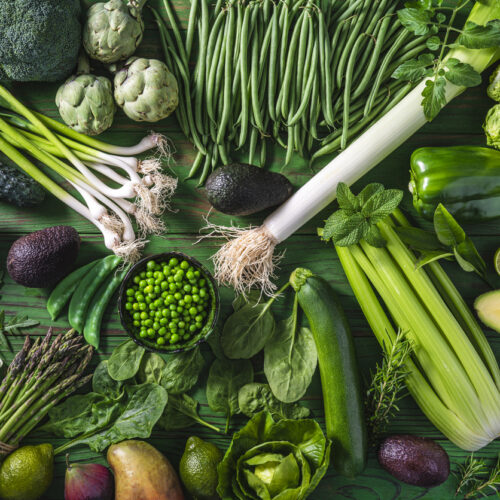
Your guide to eating and staying healthy when pregnant.
Finding out you’re pregnant is an exciting time – but it can also be scary! All of a sudden everything that you do affects not only you, but your growing baby too. No doubt you will receive all sorts of well-meaning advice from friends and family – particularly when it comes to nutrition.
As I write this, I am 29 weeks pregnant with my first child. I’ve found there’s a lot of confusion out there about what to eat, and what not to eat!
Also, while some aspects of pregnancy nutrition are well publicised, others don’t get quite as much attention. Food safety and folic acid are widely discussed but there are some other very important issues we don’t hear as much about – or may receive conflicting information about.
Basic pregnancy nutrition
It goes without saying that we need to maintain a nutritious diet throughout pregnancy. This means eating enough of the four main food groups (fruit and vegetables, breads and cereals, milk and milk products, and meat/fish/chicken/vegetarian protein) and less of the high-fat, high-sugar, low-nutrient extras.
Remember, although you may be eating for two, your energy requirements don’t double, so pregnancy isn’t an excuse to fill up on chocolate and chips!
In reality, you only need about 1400 extra kilojoules a day in the 2nd trimester. This is the amount of energy found in a cup of high-calcium milk plus a small tuna and salad roll. In the 3rd trimester you need about another 500kJ on top of that – the energy in 2 tablespoons of raw mixed nuts.
Things you need more of
Folate (folic acid)
Folate has been shown to reduce the risk of spinal cord defects like spina bifida.
As the protective level of folic acid is difficult to achieve by diet alone, women are recommended to take an 800 microgram folic acid supplement daily for four weeks prior to and 12 weeks following conception.
Bearing in mind that around half of all pregnancies are not planned, it is worthwhile considering taking these supplements even if you’re not necessarily planning a pregnancy.
Folic acid is not an expensive supplement and surprises do happen! Foods high in folate include green vegetables, legumes and citrus fruit as well as fortified cereals and fruit juice.
Iodine
Iodine is particularly important during pregnancy for the baby’s brain development.
Food produced in NZ is generally low in iodine, due to low concentrations in our soil. Health professionals are starting to see a resurgence of iodine deficiency and goitre in the population, partly due to our decreasing intake of iodised salt (most of the salt used in food manufacturing is not iodised).
A study of pregnant women conducted throughout NZ in 2006 found the majority of women had moderate iodine deficiency and 7% of women had goitre. The study’s authors concluded that pregnant women should take a supplement – which at the time was not available. However this has since been rectified and the Ministry of Health recommends pregnant and breastfeeding women take a registered 150 micrograms iodine-only tablet each day. Despite mandatory fortification of bread with iodine since 2009, it is still difficult for pregnant and breastfeeding women to meet their increased iodine needs without supplementation.
Good sources of iodine include iodised salt, seaweed, seameal custard, seafood, dairy products, eggs and fish.
Calcium
All pre-menopausal adult women should consume 1000mg of calcium per day, including during pregnancy and breastfeeding, so we need to pay attention to our calcium intake at all times.
As you can see from the table below, we need approximately 3 servings of milk and milk products plus other foods to ensure we get enough calcium. Using calcium-fortified milk makes reaching the target much easier.
| Food | Calcium |
| 150g low-fat yoghurt | 240mg |
| 1 banana | 6mg |
| 200ml calci-trim milk | 410mg |
| 1 orange | 37mg |
| 200ml soy milk cappuccino | 240mg |
| 1 cup raw spinach | 31mg |
| 1 cup chopped raw broccoli | 39mg |
| 1 tablespoon sesame seeds | 88mg |
| Total | 1091mg |
The bottom line
There’s a lot to get used to in pregnancy, least of all having to change what you eat! But, remember, setting up a healthy eating pattern now will stand you in good stead when your baby arrives; you’ll be stronger and better able to cope, and you’ll be ready to be a healthy role model.
Have a happy and healthy pregnancy!
Visit the Food Safety Authority website for more information on food safety in pregnancy.
(Updated July 2011)
You may also find these articles useful:
www.healthyfood.com










